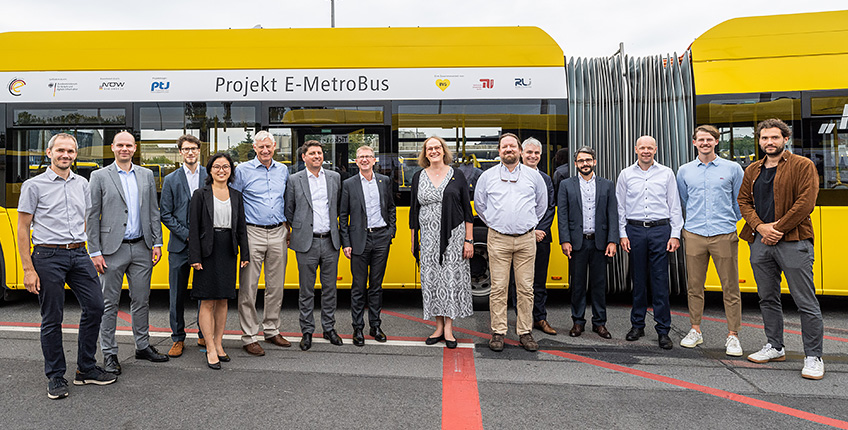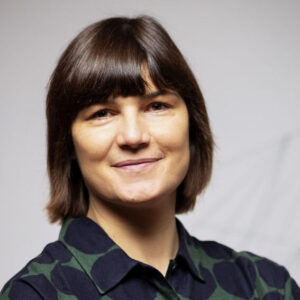In the E-MetroBus project, the Berlin public transport company Berliner Verkehrsbetriebe (BVG), together with the Technical University of Berlin and the Reiner Lemoine Institute, have integrated 17 articulated buses with battery-electric drive into their fleet.
Today, it is primarily quiet, emission-free buses that run on the project line 200 between Hertzallee and Michelangelostraße in Berlin. They replace a total of 17 diesel vehicles in operation and have saved around 3,200 t of CO2 and approx. 400 kg of NOX during the project period alone, which ran between January 2019 and December 2022.
The E-MetroBus project was funded by the Electric Mobility Funding Guideline of the Federal Ministry for Digital and Transport with a total of 5.6 million euros in funding (1.4 million euros for research and development, 4.2 million euros for the procurement of buses and charging infrastructure). The funding guideline is coordinated by NOW GmbH and implemented by Project Management Jülich (PtJ). On 19 June, the project was officially concluded, together with all project partners.
Kurt-Christoph von Knobelsdorff, CEO and spokesperson of NOW GmbH: “The transition of public transport to emission-free drives is a mammoth task. R&D projects such as E-MetroBus are enormously valuable here: Practical experience that is scientifically accompanied and processed helps all transport companies that are about to procure, set up and deploy e-buses and the associated infrastructure – as well as the industry in general in the development of a market-oriented offer.”
Dr Daniel Hesse, Head of Staff Department Technology & Innovation and Programme Manager for Electric Mobility at BVG: “We are delighted with the successful conclusion of the E-MetroBus project as a major milestone on the way towards the electrification of BVG’s entire bus fleet by 2030. The findings gained from this research project are groundbreaking for the decarbonisation of our bus fleet over the coming years – not only at our depots, but also in the implementation of charging infrastructure throughout the city.”
On their way to converting from diesel to battery-electric drive systems, the project partners worked on numerous challenges and developed solutions from which transport companies in other cities can also benefit in the future:
- In order to be able to charge the buses effectively during short break times, fast chargers, so-called top-down pantographs with a power of more than 300 kilowatts, were installed at the two terminal stops. With these, the vehicles can be temporarily charged and thus be in operation for 24 hours.
- Flexible charging times compensate for delays and diversions in Berlin’s highly frequented city traffic.
- The circulation schedules, i.e. the distance that a single bus has to travel per day, were only slightly adjusted for the articulated electric buses.
- A fast-charging technology was developed and tested that does not put too much strain on the local power grid.
The comprehensive accompanying research for the project encompassed:
- The development of an operating and energy supply concept that allows the local integration of renewable energy generation and storage into a network of electric bus charging stations as well as into an e-bus depot (an open-source planning software derived from this to support fleet electrification will be made available soon).
- More effective air-conditioning of the buses is being developed – because saving energy here is an important means of increasing the range of the buses. The measurement campaign, which was accompanied in Berlin by a survey of passengers, has already been simultaneously conducted in several major European cities and has generated important findings there as well.
In the follow-up project E-bus 2030+, the findings will be extended to an overall conversion of the fleet to e-buses. In order to make the accompanying research taking place in this project transferable to as many use cases as possible, the consortium will involve various transport companies.
Further information
More on the project:
www.e-metrobus.berlin
Subsequent E-Bus 2030+ project:
www.now-gmbh.de/projektfinder/e-bus-2030
Further R&D projects:
www.now-gmbh.de/projektfinder
Image: Conclusion of the E-MetroBus project, from left to right: Stefan Sonntag (NOW), Tim Röpcke (RLI), Norman Pieniak (RLI), Tu-Ahn Fay (TU Berlin), Prof. Dr. Dietmar Göhlich (TU Berlin), Nikolaus Oberkandler (BMDV), Dr. Rolf Erfurt (BVG), Sonja Wiesholzer (BVG), Erich Kielhorn (PtJ), Dr. Daniel Hesse (BVG), Oliver Braune (BMDV), Peer Schminkel (BVG), Steffen Schulze (NOW), Jascha Lackner (NOW)
Image source: BVG/Andreas Süß


